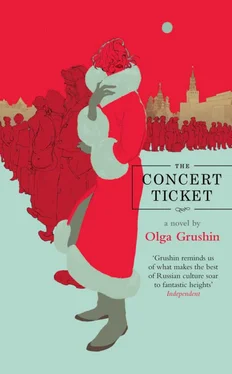There was a hush, complete, uncanny, as if an invisible hand had pressed itself against the guests’ mouths. “In our city,” a child’s voice sounded plaintively in the hush, speaking with an exaggerated foreign accent, “if you open the windows on New Year’s Eve, you hear bells ringing, crowds in the streets, singing everywhere—”
The invisible hand lifted just as suddenly, and laughter bubbled back up throughout the room. Sergei picked the streamer off his borrowed jacket, dropped it onto the floor, played another song. He had expected something else, but it was just another year—hardly worth the torment of a guard’s beefy hands running up his legs.
An hour or two later, he asked for permission to visit the facilities. The man from before, the one in the resplendent tuxedo, trained a double-barrel gaze on his face, then motioned to a guard whose head looked disturbingly small atop the massive expanse of his shoulders, like a lightbulb propped up on a shelf. They moved across the ballroom in a short grim procession, the tuxedo in front, the shoulders in the rearguard, another, upside-down procession at their feet, reflected in the shining floors. Sergei turned to face them by the door.
“Are you going to follow me in?” he asked without expression.
The lightbulb looked at the tuxedo. The tuxedo shook his head.
“Wait for him here,” he said. “And you, hurry up.”
Beyond, there were more mirrors, more flowers, more marble. A row of doors ran along the wall. Averting his eyes from the hordes of tall, middle-aged, morose tuba players in ill-fitting jackets who dogged his steps from mirror to mirror, he tried one of the inner doors, was blinded by porcelain, spent some time fighting the odd springing mechanism of the lock. After a while he heard a swelling of noise outside his stall, a snippet of jaunty music; then, with a soft percussive clap, the noise cut off, and two sets of steps walked across the marble, one crisp and assured, the other shuffling, old.
Water splashed. Sergei negotiated his zipper.
“—thirty-six years ago, as I recall,” said a low voice. “He left just after the closing of the borders. Escaped across the sea. Our loss, your gain. But are you sure?”
“Oh, quite,” replied the other. “It’s in all our newspapers.”
The second voice had a crack running down the middle, a crack of age—the shuffling steps, then—but what gave Sergei a start was the accent. The speaker was a foreigner.
He checked his hand on his belt, afraid now to give away his presence.
“Yes, imagine that, how time flies,” the accented voice said, “after all these years—” The words drowned as a cascade of water fell into the sink, and for two or three endless minutes, frozen in mid-movement, he heard nothing but splashing. Then the splashing slowed to a steady trickle, and the foreigner’s voice dove in and out: “… so they are finally allowing him… one concert in his hometown… a new symphony he’s written… the concert will take place a year from now, on New Year’s Eve… only three hundred seats, so the tickets will be rather—”
Sergei found himself straining to hear with such intensity that the insides of his ears were starting to ache. More water gurgled, then the native voice swam up, speaking urgently: “—his music is so unorthodox, so unusual—aren’t they afraid that people might—”
In the next instant, a thundering waterfall erupted under Sergei’s elbow: he had accidentally rested it on some handle that had given way. A shocked silence rang outside, followed by the hasty retreat of the shuffling steps, the tide of the party coming in, then rolling back. Cursing under his breath, he tore at the lock, clambered out of the stall—and nearly collided with a tall gray-haired man in a tuxedo, his face concealed by a mask.
Got the steps wrong, Sergei thought mechanically.
The foreigner’s hands were bleeding soap onto the marble floor, the foaming pink suds touching down with the faintest of sighs. Water dripped from a bright faucet, drip-drip, drip-drip-drip, a melody lost there somewhere. Giving a small shrug, the man turned toward the sink, and fleetingly Sergei saw the distorted, fattened reflections of his fingers slide across the faucet’s silver surface—the unmistakable, immaculate fingers of a musician…
He took an unthinking step forward.
“The man you were talking about just now,” he said in a voice that was nothing like his own, high and pinched, “the musician who’s coming here, who is he? I too am a musician. I heard you speak. I—”
The door yawned open, and the massive shoulders filled the frame. The guard leveled a low-voltage stare at Sergei’s face.
“Is this person bothering you, sir ?” he asked, his voice sagging with menace.
Sergei’s heart thudded, then stopped, then fell somewhere, and he fell after it, through a trapdoor he had not known was there—into a blinding light of danger, of madness, of sheer unreality, the water dripping, the pompous lavatory, the foreign embassy, oh what have I done, what reckless, irretrievable, criminal thing have I done—
“I not understand,” the foreigner said dismissively.
Frozen with mute horror, Sergei watched him dry his hands on a towel. As the guard strode along the stalls, peeking under the doors, the foreigner raised his eyes to the mirror; they glittered through the slits of the mask, calm and unreadable, but it seemed to Sergei that somewhere in the uncertain, multiplying world of reflections, a gray eye closed in a nearly imperceptible, knowing wink. Then the man was gone.
“This incident will be recorded in your dossier,” the guard hissed.
Recovering his speech, Sergei began to stammer. He was one of the most reliable members of his orchestra, ask anyone, ask the drummer, he has known me all my life, he will vouch for me, ask the director, just don’t put this stain on my blameless record, a simple misunderstanding, two men obeying the call of nature, could happen to anyone, I would never, I’m forty-seven years old and in all this time I never—
The heavy stare was pawing, pawing at his face.
“We will be watching you closely ,” the guard said at last. “Resume your duties.”
The dim lightbulb of the guard’s stare went out. He was free to return to the ballroom stage, to continue breathing a bouncy beat into his tuba.
It was close to four in the morning when they were finally divested of their tuxedos. The festivities had long since unraveled, the rooms lay empty and echoing; a solitary woman in a low-cut satin dress sat on a sofa in a corner, her mask askew, absently dropping green grapes into her gaping, drunken mouth. Sergei made his way to the exit, a trembling tightness in his stomach, praying that his documents would be returned to him without trouble. He was crossing the vestibule when, through the open front door, he saw two men smoking on the steps outside, conversing loudly in a foreign tongue. He halted. Their faces were bare now. One of them said something, and they both laughed, and tossed away their half-finished cigarettes.
“Wasteful bastards,” Sviatoslav grumbled, overtaking him. “Coming?”
Recollecting himself, Sergei hurried across the threshold after the drummer, nearly slipping on the sleek polished floors; but already the two foreigners had turned to go in, and he had to step aside to let them pass. In the doorway, the taller of the two, a grayhaired man with clear gray eyes and a thin aristocratic nose, glanced at Sergei with a small yet significant smile, and a footfall later Sergei heard the soft sound of something light hitting the stones.
A flat blue box lay on the steps where the men had just stood.
He cast a panicked look around him. No one was watching. The last members of the orchestra were receiving their papers at the booth ahead, the tuxedoed backs were retreating into the mansion behind him. He bent down, grabbed the tiny box, which threw a golden flash in his eyes, nearly dropped it at the unexpected dry rattle it emitted—there was something inside—stuffed it into his pocket, and, his upper lip glistening with sweat, his heart wobbling, caught up with the other musicians.
Читать дальше












